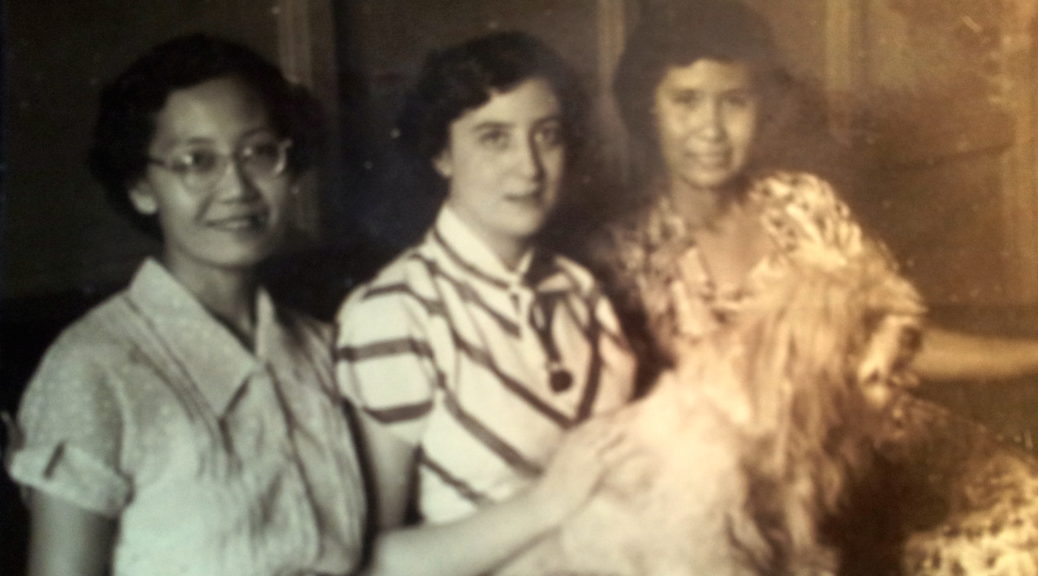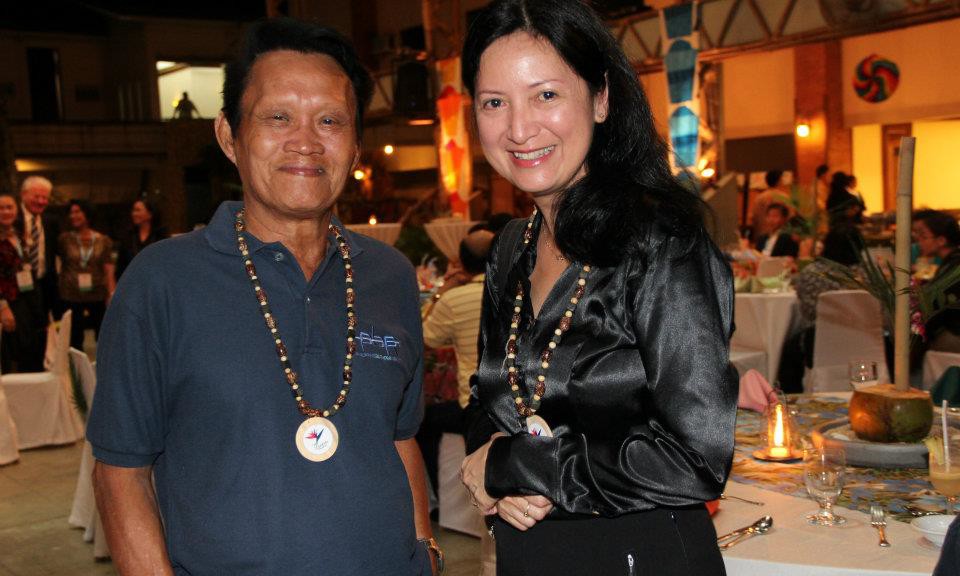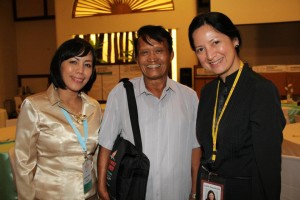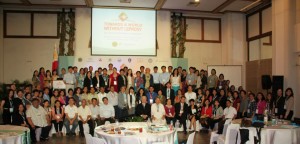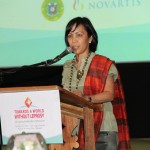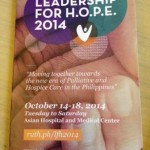Invariably, whenever I would bump into an older graduate of the College of the Holy Spirit where I studied, I would be asked, “How is Miss Maria Luz? How is Dean Julia Iturralde?” And then they would launch on how the two sisters left an indelible impression on them, how much they missed them, and how thankful they are for the values and learning they received. Sadly I would tell them that my two aunts, younger sisters of my father, had passed on.
My brothers and I grew up in the family compound right behind the Basilica of San Sebastian. My mother was widowed early, and so we were raised in a maternal environment: my mom, my father’s mom Lola Ingga, my father’s aunt Lola Teta, and my two maiden aunts: Julia and Maria Luz. My father had another sibling, Tita Rory, but she had entered the nunnery and became a Sister Servant of the Holy Spirit (SSpS) and so we hardly saw her.
My two aunts figured largely in my growing up years, and this is my tribute to the two women who I love dearly.
Maria Luz Iturralde
My godmother and aunt, Maria Luz Alvaro Iturralde died in the wee hours of December 31, 2008 while I was in Texas. I can still remember my sister Pinky’s sobbing voice trying to tell me the sad news over the phone, which she had received from Paz, my sister-in-law in San Francisco, who had in turn been called by my brother Paul. The news had traveled swiftly around the world.
I quickly called my mother in Manila. She had not even heard the news yet. All she knew was that my brother Paul had brought Maria Luz to the hospital at midnight. Then, I woke up Bea and asked her to go to Quiapo to be with my mom and help out with arrangements. Like real troopers, my daughters Bea and Cara, with their cousin Monchoy, took charge of the wake while my brother Paul made the funeral arrangements.
The rest of us siblings (Johnny, Pepito, Pinky and I) felt helpless being so far away. All I could do from the other side of the globe was write down my memories of our aunt for an online memorial. Maria Luz loved to write. This was the best way I could think of to pay her tribute.
Maria Luz or Lucy or Frenchie as her friends would call her or Dada Uds as her grand nieces and nephews called her was a writer non par. She was the longest running moderator of Action (1947-51), Veritas (1980-94), The Profile, and The Faculty Review. Udsy was also the editor of The Search and We the Alumnae. She was an excellent writer and would write under the monicker Sub-Rosa (or chismis queen). I remember many trips to the National Printing Press in Quezon Avenue to check on various publications. She guided the exhibit for the College of the Holy Spirit’s 75th anniversary.
An English teacher at the College of the Holy Spirit, Udsy dedicated herself to helping students learn to love the English language. Quick-witted, she entertained her students with stories about family and life, making her dearly beloved to all of them. She was my English teacher as well, from the time I learned how to speak, read and write. In college, I studied English under her. She prodded me into writing and editing for the school paper. My baptismal godmother, she was always there to watch over me and guide me. And I had to study extra hard to make sure that I earned good grades.
She taught for 49 years at the school that she loved with all her heart, and was guidance counselor for a long time. I remember her anguished crying when she was replaced as the guidance counselor. Her life revolved around that school, and when she was forced to retire, she was terribly disheartened. Writing and editing kept her alive, and when she was removed by the CHS Alumnae Foundation as editor-in-chief of We the Alumnae on the pretext that the newsletter would now be computerized, she lost all interest in life.
As a young girl, Udsy excelled at sketching. Sports-minded, she won two trophies for marathon running. She studied Elementary Education for Teaching Children at Holy Ghost College (now College of the Holy Spirit).
A frequent visitor of the school’s bodega when she was a youngster, Udsy was always sent there for being the naughtiest girl in school. She was the bane of Erundina Fernandez (who later, for a time, became my mother-in-law and wrecked her revenge on me), Teofisto Guingona who called her “kabayo” because of her kicking him with her boston, and Alejandro Reyes who later became dean at San Beda.
Udsy was brave to the point of carelessness. During the Japanese occupation, a man was shot by the Japanese on our street. Without thinking of her own safety, she ran to him to give him the Last Rites. She would always take the side of the oppressed, and if she felt any of us were being given a hard time, she would take it upon herself to defend us.
Udsy loved to clean. Cleaning was her thing. She was very OC about this. The wooden staircase was not acceptable until it was gleaming. Her room was off limits to all us, unless it was story-telling time. She never liked the kitchen, and could not cook as far as I know. Kitchen duties were reserved for her sister Julia. But, oh, how she loved to eat! To the very end, she was always hungry, even if she had just eaten five minutes before.
Story telling was her thing. And for this, no one came even close. She was a master storyteller. And we lapped it all up.
I always credited my love of reading and literature to Udsy. When my brothers and I were young, we didn’t enjoy the usual fairytales like Goldilocks and the Three Bears, or Cinderella or Snow White. Instead, Udsy would regale us with stories of Greek, Norse and Roman mythology. Zeus, Hera, Aphrodite, Poseidon, Apollo, Athena, Hades and Ulysses. These were our heroes and heroines. The Three Fates – Clotho, Lachesis and Atropos – caused me nightmares. When would Atropos cut the string of my life, I anguished? Why, before The Lord of the Rings became a hit serial movie, we knew the entire story from beginning to end.
We eagerly looked forward to her payday because she would bring us to Goodwill in Escolta or to Bookmark and Alemars in Avenida Rizal and let us buy whatever book we desired to read. We had a complete collection of Hardy Boys and Nancy Drew books. When I got into my teens, she even indulged my love of Barbara Cartland and pocketbook love stories. On my 16th birthday, she got me a dozen pocketbooks. That was a special day!
Hot-tempered, Udsy easily got agitated. But when she was calm, she was very gregarious. She was always the life of the party, or so I remember. She would force my brothers and I to perform for her guests (mostly nuns, teachers and students) during parties at home. We had to recite a poem, dance or sing. Rock-a-bye-baby and Joyce Kilmer’s Tree Poem were favorites of mine.
When Udsy was angry, she was like a grenade, hurting everyone within reach. It was wise to stay out of her way. She would run over everyone. She would fly off the handle if she could not find a book, and would accuse us of getting it without permission. But when she would find it, her way of apologizing was to treat us to a Coke. And, oh, how she loved to drink Coke!
She wanted us to be serious about our studies, and thought anything unrelated to school work was the Devil’s work. One time, I was invited to become a model. Udsy was so angry, she threw a basin of water from her second floor window over the agents who came to take my photo. Naturally, that was the end of my budding modeling career.
Near-sighted in one eye, Udsy always wore glasses for as long as I can remember. Red lipstick was her trademark. She kept her shiny black hair short and hated it when white hair started to appear. She commissioned us to pick out her white hair with tweezers and would pay us a centavo for every three white hair we got out. She had her breasts removed when she was in her early twenties because of a cancer scare. She told me the surgeon made a mistake and took out her good breast, and when he realized his error, removed her other breast. She heard him talking about his mistake during her operation through the haze of her anesthesia. This caused her lifelong fear of doctors and medicine. Otherwise, she was in the pink of health for most of her life, all 5’4” and 98 lbs.
Udsy secretly admired my late husband, Mike, and would cut out his articles from different newspapers, save them in a brown envelope and give them to me each time I visited San Sebastian.
In her later years, Udsy became schizophrenic, thinking everyone was out to get her. It was truly sad seeing her fall into deep depression. She would physically hurt her caregivers, and so we decided to put her into a nursing home in Calamba run by nuns. We felt then that she and my aunt Julia would have better care there. We brought the family’s Christ the King statue to Calamba to watch over them. I was relieved though when my brother decided to bring them back home to San Sebastian. This was their home where they were happy.
Julia Alvaro Iturralde
On February 8, 2015 while vacationing in Rome. I received word from my mom that my father’s only remaining sibling, Julia Alvaro Iturralde had passed away. In a way, I was relieved. She had been ill for a very long time, her brilliant mind long gone, her once robust body withered and thin. She still managed a cherubic toothless smile whenever I would visit and remind her that I was Monette, her niece. Sometimes she would remember me. The last time, she did not, and it saddened me greatly. She asked why it was taking her parents long to fetch her.
Julia was born on October 7, 1931 to Jose Manalo Iturralde and Dominga Alvaro. The youngest in a brood of six, Julia or Jill as she was fondly called, was an extremely intelligent individual. She graduated Magna Cum Laude with an AB-BSE degree from Holy Ghost College, and finished two masteral programs: Master in Sociology from Ateneo University and Master of East Asian Studies from Radcliffe, where she enjoyed a scholarship. Jill held the deanship of the Liberal Arts Department of the College of the Holy Spirit for 23 years. She was also moderator of Action, Veritas and The Profile from 1964-67. A prolific poetess, Jill expressed her emotions in beautiful words.
My first recollection of Tita Jill (and later Dada Nings), as we fondly called her, was playing in my grandmother’s warm kitchen with a white porcelain tea set decorated with flowers that she had given me. I must have been less than three then. Pouring real milk tea in the tiny cups, she sat with me on the floor, and we pretended that we were having guests over. Sometimes, we would collect the moss in the garden, place them on the tiny plates and pretend it was salad. Other times, I got lucky and we actually ate food that had just been cooked in the kitchen.
When she came back from taking her masters at Radcliffe University, she brought home a huge walking doll for me. Oh, how I loved that doll with curly blonde hair! It was almost as tall as I was.
Tita Jill taught me how to pray before I slept: “Angel of God, my guardian dear, to whom God’s love entrusts me here. Ever this day be at my side, to light and guard, to rule and guide. And if I die before I wake, I pray the Lord, my soul to take. Amen.”
Summers, when we were growing up were spent in that kitchen. She would teach us how to bake, decorate cakes, and then let us experiment in the kitchen. I remember crying when my cake didn’t rise because I had forgotten to put baking powder in the mix. My brothers and I would fight as to who would clean up the leftover fudge in the bowl.
I loved watching how she cooked, and she would let me be her little assistant, though I was not allowed to wield a knife. I was assigned to mixing food. Getting egg whites to stiffen up was the hardest task ever. “Whip it 100 times, Monette, and don’t lift the spatula up or the air would escape,” she would admonish me. I would try valiantly to soldier on even if my arms felt like they were about to fall off. Looking back, I realize now that she had nurtured my interest in food.
Dada Nings taught Asian Studies at the College of the Holy Spirit, and to drive home learning, she would host parties at our ancestral home in San Sebastian for her students. They would cook Asian dishes, and wear dresses from the different countries they were assigned. My personal favorite was her sukiyaki. I loved watching them prepare the food, and then perform Asian songs or dances after. Oh, that was a lot of fun!
And she made life fun for her nieces and nephews. On Holy Saturdays, she would herd us into the dining room, give each of us a brush, and we would paint dozens of eggs for the Easter Egg Hunt the next day. I guess she must have hidden the eggs in the garden while we slept because we had fun hunting for them after mass on Easter Day.
We would have our own version of Flores de Mayo. We would dress up as saints using her clothes and stack of ribbons and scarves, parade up and down the house, then have a raffle of little knickknacks that she would collect. Oh, and we were not the only ones who had fun dressing up under her guidance. Her students were also in on it. I remember one Marian festival where she had her students dress up as different versions of Mama Mary and stand up like statues around the garden by the CHS Mendiola chapel.
She was a consummate writer, poet and story teller. She wrote plays about the Old Testament which her students performed in school. She wrote poems for the school paper, the CHS alumnae newsletter, and later for the newsletter she and her sister Maria Luz put up. She penned a book entitled Family Treasures which revealed all of the Iturralde secret recipes, and which I use to this day. Her friends gathered some of her poems and published them together with pieces written by my other two aunts, Maria Luz and Sister Encarnacion.
Early on, she encouraged us to perform during parties at home (Actually, I think a better word would be mandated). We either had to sing, dance, or recite a poem to the guests who invariably were their fellow teachers and nuns from the College of the Holy Spirit.
She was a very kind soul, soft-spoken, and yet you knew you were in deep trouble if you ever crossed the line. When I was in first year college, a classmate from elementary asked if she could visit me at home on a Saturday. I had not seen her for some time and was excited to see her. She came to the house with her father who was an advertising executive. A popular soft drink brand was giving away a car to the lucky person who found the tansan (bottle cap) with the winning mark. Apparently, he was running the contest, and he told me that he would make sure I would win the car, but in return I would have to sell the car and split the proceeds with him. I was to let him know my decision on Monday.
Naturally, I was very much tempted. Since my father died when I was ten, we were hard up. The funds would come in handy so I could pursue my dream of studying law, buy things I’ve always wanted, give my family a more comfortable life. At that time, I was studying on scholarship. I discussed the options with my Tita Jill, who advised me of the importance of being true to the values of honesty and integrity. That night, she gave me two cards she had drawn. Depending on my decision, I was to open one of the cards. That weekend was excruciatingly difficult for me. I decided to turn down the offer, and opened the card. Here’s what was written:
“Dear Monette,
You lost. W-a-a-a-a-h… sob sob… Boo hoo… Boo hoo. Hikbe… Sniffle… Sniffle…
But to me, after Monday, you are taller than a giraffe, taller than Empire State, taller than Mt. Everest.
You are one of us – born losers whose poverty is their (sic) our wealth.
At any rate, I’m so proud of you, so proud that I can treat you to a Shakeys pizza tonight!!!
Love,
Ninang
October 23, 1975″
And then, I opened the other card. It said simply:
“Dear Mongga,
Hooray!! Tsup!!!
Love,
Nings”
I knew then that she was very proud of me for making the right decision. That for me was the most beautiful gift she had ever given me. I treasure those two cards to this day.
I always wanted to study Fine Arts but we didn’t have the funds for this. But the summer after the softdrink incident, Tita Jill enrolled me in a summer class in painting at CHS. I was in heaven! The next summer, she enrolled me in theatre class, along with my brother Pepito.
She was always looking for ways to encourage our various interests. I remember the day the encyclopedia set she had purchased arrived. Pepito and I who were in grade school then were so excited, we spent the entire summer reading the encyclopedia from A to Z. We also played Scrabble and Monopoly with her. Tita Jill’s bed could be spotted a mile away because of the mountains of books and papers that littered it.
College studies was a different matter. Because I was on scholarship (which was the only way I could afford studying at CHS), I had to study very, very hard. It was made more difficult because my aunts worked at the school: Sr. Encarnacion taught Theology, Maria Luz headed the English Department, and Julia served as dean of Liberal Arts. They were stricter on me than anyone else, because they wanted to prove that I could make it on my own. They were thus ecstatic when I graduated with a Summa cum Laude.
Although she was the youngest sibling of my father, Tita Jill appeared to be the head of the family when it came to decision making. She was always protecting her older sister from harm. When Tita Jill and Tita Udsy (Maria Luz) were forced to retire from CHS, they started a newsletter to keep their minds busy. I suspect that Tita Jill used her retirement funds for this as Tita Udsy who had unceremoniously been removed as editor-in-chief of We, the Alumnae, had gone into deep depression. She wanted to make her sister happy. Tita Jill bought a computer and learned to use it.
Things got worse when my cousin Jose Rene and his mother Vicente died and Tita Jill was left to cope with the legal issues on inheritance. The stress was too much for her, and she suffered one stroke after the other, with complications from diabetes. She lost her eyesight, and this was a crushing blow to someone who was as widely read as her. As the years went by, she became less and less interested in life, and would just lie down, seeming to wait for her parents to come and fetch her. And now, they have finally and they are all reunited in their real home in heaven, with Christ.
Though I miss them terribly, I am happy that they are now at peace. I thank the Lord for the gift of having had them both as my aunts, and will always keep them in my heart. May they rest in God’s embrace forever.
